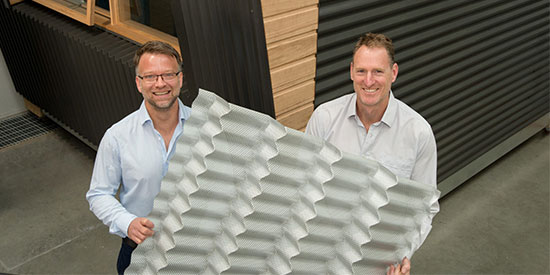Geelong steel-bending start-up hits its stride
Research news
After launching only four years ago, the Geelong start-up FormFlow is on a rapid path of expansion – expecting to double its workforce in the coming 12 months.
The Deakin University-incubated high-tech company FormFlow has signed a deal with Australia’s largest steel producer BlueScope Steel to commercialise its world-first, patented technology. This technology allows manufacturers to bend corrugated steel at sharp angles without damaging the steel structure or coating, with many applications across the construction sector.
Backed by Deakin University and others, FormFlow was incubated at Deakin’s advanced manufacturing innovation hub ManuFutures. Its founders, engineers/metal formers Dr Matthew Dingle, Dr Matthias Weiss and Ross and Lyn George from Austeng, are delighted their technology in on track to transform Australia's construction sector and is likely to enter the global market.
“This arrangement with BlueScope Steel is part of a long-term relationship,” said Dr Dingle. “FormFlow is now a technology development partner of BlueScope. Our 90° bend will be produced by BlueScope’s Lysaght division and we are developing the technology to produce a range of new angles, with 60° bends the next goal.”
The FormFlow bends are structurally stiff and strong. They can make a structure seamless and airtight, eliminating the need for capping and improving energy efficiency and fire resistance.
The BlueScope deal is just one of several initiatives propelling FormFlow in 2020. In fact, the business has outgrown its ManuFutures home and is in the process of relocating to larger premises in Geelong’s Northshore industrial area. Currently employing 12 staff, its founders expect to employ at least 24 within 12 months.
FormFlow is attracting huge interest from residents and businesses in towns such as Cobargo and Rosedale in Southern NSW, where communities are seeking to recover from the devastation wrought by the summer bushfires.
“Many people who lost their homes weren’t insured or were under-insured, and to meet new fire zone insurance ratings, they need economical, fire-resistant solutions,” said Dr Dingle.
“We are in discussions with the Business Council of Australia to see how we can help as many people as possible build new homes and businesses in fire-affected areas, and we are working with architect Ian Weir, a specialist in designing houses in bushfire-prone landscapes, to create appropriate designs.”
The company also now has a contract to produce seven modular homes in Geelong for Samaritan House, to be used as transitional accommodation for people who have experienced homelessness. This project was supported by Professor James Doerfler from Deakin’s School of Architecture and Built Environment who spotted the potential of FormFlow’s technology to produce attractive, economical, transitional housing.
FormFlow’s journey is just beginning – showing just what a difference a bend can make.
Learn more:
Share this story

Key Fact
Dr Matthias Weiss and Dr Matthew Dingle
